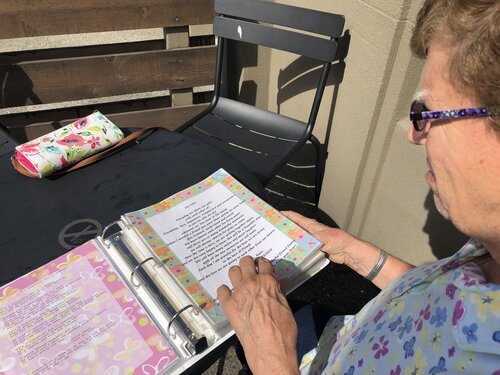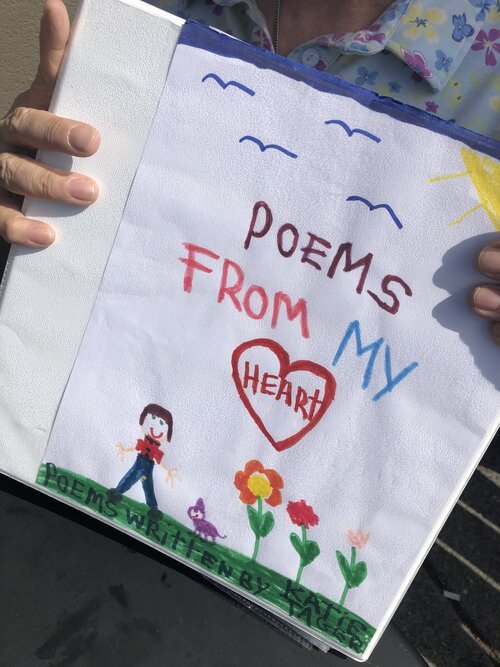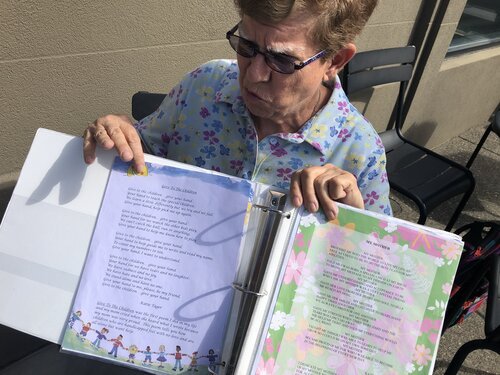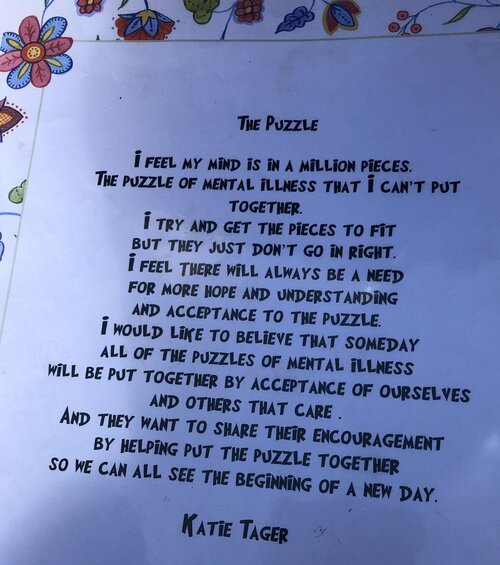The Puzzle of Katie Tager
An OCH patient pieces together her challenges with mental health, finding safety not necessarily in places but in people and poetry instead.
It’s a real puzzle for Katie Tager when she’s tasked with trying to find her “safe place.” Clutching a notebook filled with her personal poems, she talks about what “safe” means in her mind and her memories. And more about what it is not.
Born with developmental disabilities, Katie grew up fully aware she was different from other people. She felt loved by her parents, who often told her she was “special.” But when people called her names, like “retard,” she felt confused and sensed she was never good, smart or capable enough. She wondered why she evoked so much hate and meanness in those around her if she was actually someone who was good and special. As the years went by, Katie could tell her parents didn’t really know how to help her in spite of their efforts and love. She also noticed their frustration, feelings of inadequacy and shame in response to the angst they experienced in trying to manage her condition in world lacking compassionate, effective supports.
Katie’s mother battled cancer off and on, which further rocked Katie’s life emotionally, particularly since her mother was always there for her and even volunteered to help others who were disabled. Then, stressed for a number of reasons, Katie’s father got a little too angry sometimes, which added to her sense of fear in the place where she thought she should feel safest: home. And when she was old enough to work, such as at schools or for other employers, Katie recalls being frequently misunderstood and falling short of job expectations. She also felt her employers didn’t know how to help her succeed, managing her poorly, which contributed to greater struggles around self-esteem and feeling “safe” in the job world. Schoolchildren and even adults teased her, making matters far worse.
Katie developed mental illness, getting diagnosed in her 20s, and the fact that she was also a victim of sexual abuse didn’t help her emotional and mental condition. She says she felt for years like she was in some “closet,” with the door shut, not able to connect or communicate with others outside and beyond.
“I was in the darkness,” she says, noting that after her mother died, she wasn’t sure she could carry on. “Particularly after my mom passed away, I didn’t want to live. I loved her so much, and yet I never could talk with her about my disabilities—and I wish every day that I could have.”
Yet today, holding the book of poems, she talks openly to those who don’t know her so well—but who care to listen—about her disabilities and struggles. Of note, she talks of progress, goals and hope…a seismic shift in headspace and communication that hasn’t come easy but taken place, in part, with the help of One Community Health’s Kim Thomson, LCSW.
After seeing a number of different mental health therapists over the years, Katie started having appointments with Kim in 2018. Since then, she’s been learning strategies to deal with her trauma and better manage its side effects, such as fear of sleeping, nightmares, hearing voices in her head, self-doubt, shame, loneliness and more.
“Kim really listens to me,” Katie says. “If I have a question, she explains things to me right away in a way I can understand. In the past, I haven’t always been able to talk about some things with other counselors, but she’s more understanding in a way than other counselors, and I can talk to her about everything, and she says things back to me that I understand.”
At some point in counseling, Katie says she was asked to write down her feelings. She did, but simply writing out feelings didn’t get across what she was truly experiencing in her heart and in her head. So Katie tried writing a poem and, in doing so, discovered an ability to fully express what she finally felt—describing the past and the present, her pain and her joy, her wishes and needs, and, now, a sense of hope.
“Sometimes the poems I write are not very good, but sometimes I write good poems,” says Katie, flipping through her binder, containing dozens of if not 100+ pages of typed out poems that she dreams of getting published. “Now Kim is asking me to meditate…we’re trying to find some ways to do that. That’s really hard for me because she wants me to think of a safe place in my head.”
The idea surfaces that maybe thinking of a “safe place” isn’t some impossible puzzle after all. It could just be a matter of picturing people she loves or with whom she feels connection—not a “physical place” or location per se but thoughts of safe relationships, safe people—her mother, her caretaker, and even Kim. And with that, a breakthrough expression shines on Katie’s face—a glint of fresh understanding reflects in her eyes—before she turns back toward her notebook and reads the poem she holds in her hand:
The Puzzle
i feel my mind is in a million pieces
The puzzle of mental illness that I can put
Together
i try and get the pieces to fit
But they just don’t go in right.
i feel there will always be a need
For more hope and understanding
And acceptance to the puzzle
i would like to believe that someday
All of the puzzles of mental illness
Will be put together by acceptance of ourselves
And others that care.
And they want to share their encouragement
By helping put the puzzle together
So we can all see the beginning of a new day.
— Katie Tager






